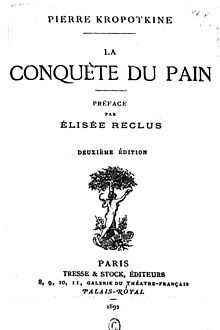Anti-statism
| Part of a series on |
| Anarcho-communism |
|---|
 |
|
Concepts |
|
Organizational forms |
|
Theoretical works |
Anti-statism is a term describing opposition to state intervention into personal, social, and economic affairs.[1]:260 Some anti-statist views reject the state completely and in some cases rulership in general (e.g., anarchism).
General categories
Anti-statists differ greatly according to the beliefs they hold in addition to anti-statism.
A significant difficulty in determining whether a thinker or philosophy is anti-statist is the problem of defining the state itself. Terminology has changed over time, and past writers often used the word, "state" in a different sense than we use it today. Thus, the anarchist Mikhail Bakunin used the term simply to mean a governing organization. Other writers used the term "state" to mean any law-making or law enforcement agency. Karl Marx defined the state as the institution used by the ruling class of a country to maintain the conditions of its rule. According to Max Weber, the state is an organization with an effective legal monopoly on the legitimate use of physical force in a particular geographic area.
Henry David Thoreau expressed this evolutionary anti-statist view in his essay Civil Disobedience:
I heartily accept the motto,—"That government is best which governs least"; and I should like to see it acted up to more rapidly and systematically. Carried out, it finally amounts to this, which also I believe,—"That government is best which governs not at all"; and when men and women are prepared for it, that will be the kind of government which they will have.[2]
Anti-statist philosophies
- Anarchism and its inner schools of thought:
- Agorism
- Anarcha-feminism
- Anarchist communism
- Anarcho-capitalism
- Anarcho-naturism
- Anarcho-pacifism
- Anarcho-primitivism
- Anarcho-syndicalism
- Buddhist anarchism
- Christian anarchism
- Collectivist anarchism
- Egoist anarchism and the philosophy of Max Stirner
- Existentialist anarchism
- Green anarchism
- Individualist anarchism
- Insurrectionary anarchism
- Jewish anarchism
- Libertarian socialism
- Mutualism
- National anarchism
- Social anarchism
- Synthesis anarchism
- Veganarchism
- Voluntaryism
- Nihilist movement
See also
References
- ↑ Gallaher, Carolyn; Dahlman, Carl T.; Gilmartin, Mary; Mountz, Alison; Shirlow, Peter (2009). Key Concepts in Political Geography. London: SAGE. p. 392. ISBN 978-1-4129-4672-8. Retrieved July 31, 2014.
- ↑ Civil Disobedience. Annotated works of Henry David Thoreau. Thoreau Society.
